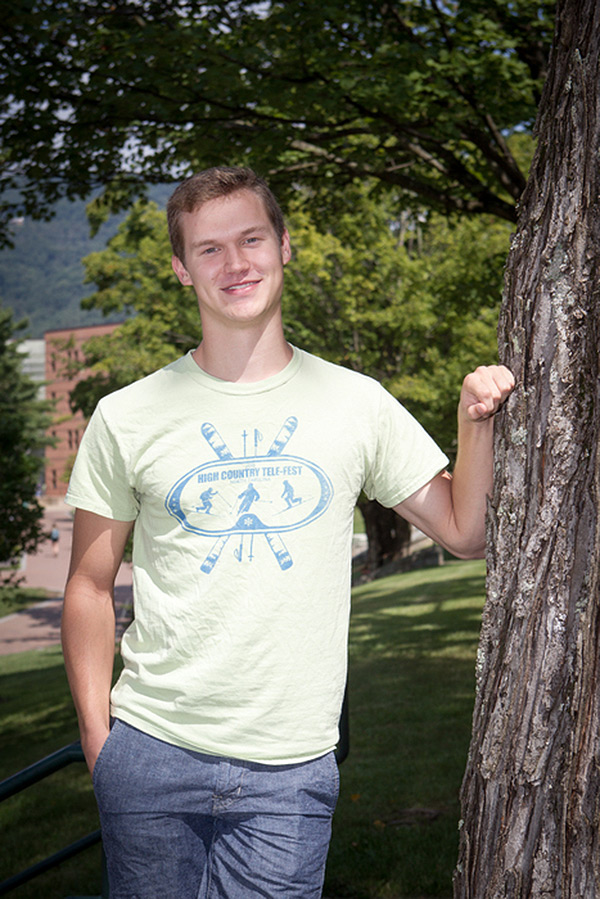
Eric Burton, a senior geography major, at the beginning of Fall 2016 semester. Burton was the recipient of the National Oceanic and Atmospheric Administration (NOAA) Ernest F. Hollings Undergraduate Scholarship that included a large academic stipend and a summer internship at NOAA’s Princeton, New Jersey, facility. Photo by Marie Freeman
BOONE—Eric Burton, a senior geography major in Appalachian State University’s Honors College, could be the poster child for the university’s General Education program – a course of study that promotes critical and creative thinking; effective communication; making local-to-global connections and understanding responsibilities of community membership.
A first-year geography class, part of his General Education curriculum, set a course for Burton that has included undergraduate research, two study abroad experiences and a National Oceanic and Atmospheric Administration (NOAA) Ernest F. Hollings Undergraduate Scholarship that included a large academic stipend and a summer internship at NOAA’s Princeton, New Jersey, facility.
“The Gen Ed program worked out really well for me. I’ve had the freedom to explore lots of things and find out what interested me,” he said.
Here, and in Peru, Burton is engaged in undergraduate research with Dr. Baker Perry, whose geography class captured the freshman’s imagination. His work with Perry was a huge factor in getting the Hollings scholarship, Burton contends. “The focus on undergraduates here is good,” he explained. “I’m not doing busy work, but working on my own project. Professors have the time and freedom to work with the students and not be totally focused on their own research.”
Critical and creative thinking
Burton’s 10-week paid internship at Princeton focused on checking weather models for accuracy and mapping predictions for the southern hemisphere. Specifically, Burton was monitoring tropical ozone concentrations in the lower atmosphere. The NOAA facility, he explained, “is all about climate modeling, comparing the models to actual observations and seeing how well the model represents what is actually going on. Once you’ve established that it does a pretty good job, you can use that model to look at cause and effect.” The research collected at the Princeton facility ultimately “will contribute to the Intergovernmental Panel on Climate Change report – the word on climate change and specifically air quality,” Burton said.
Burton has taken two study-abroad trips to Peru trekking through the Andes, exploring Machu Picchu and learning about the culture and people of the Andes. His second trip included a research expedition onto a glacial icecap. “We look at precipitation there. We’ve installed weather stations,” he said, “and (back at Appalachian) I watch that data and determine patterns that result in precipitation and contribute to glacier health or decline.”
“The glaciers are definitely melting,” he said. “I don’t have a fatalistic view but there are changes that need to be made. We can adapt. I hate it for the people we’ve met there, who depend on the glaciers for agriculture. It’s their water resource and they depend on the melt water.”
Local-to-global connections
Burton made a correlation between the mountain dwellers of Peru and the people from the Appalachians. “Both cultures are really knowledgeable about climate. They know what’s going on with the weather and have their traditional ways of predicting how the winter’s going to be. The folk methods, it turns out, are pretty accurate. I saw a lot of connections between the two mountain areas. In Peru, you don’t just walk onto somebody’s land. But if you do, and are polite and act correctly, they’re glad to see you. It’s the same here. And like the people here, they are very self-reliant.”
Burton’s next step after graduation is to go on to graduate school. The Marion native says he is undecided about whether he should “keep going with the environmental side of things, strictly earth science research, or relate it more back to society, or the connections between the two.”
He is pretty certain about another issue: “I’m pretty low confidence on any predictions for the ski season.”
About the Department of Geography and Planning
The Department of Geography and Planning promotes the understanding of the spatial dimensions of human behavior within the physical and cultural systems of the earth and the role of planning in achieving improvement in those systems. It offers degrees in geography and in community and regional planning. It is part of the College of Arts and Sciences.
About Appalachian State University
As a premier public institution, Appalachian State University prepares students to lead purposeful lives. App State is one of 17 campuses in the University of North Carolina System, with a national reputation for innovative teaching and opening access to a high-quality, cost-effective education. The university enrolls more than 21,000 students, has a low student-to-faculty ratio and offers more than 150 undergraduate and 80 graduate majors at its Boone and Hickory campuses and through App State Online. Learn more at https://www.appstate.edu.
What do you think?
Share your feedback on this story.




![How NCInnovation Is Rethinking Economic Development in North Carolina [faculty featured]](/_images/_posts/2026/02/rethinking-economic-development-600x400.jpg)






